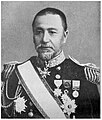Wikipedia:Selected anniversaries/May 28
This is a list of selected May 28 anniversaries that appear in the "On this day" section of the Main Page. To suggest a new item, in most cases, you can be bold and edit this page. Please read the selected anniversaries guidelines before making your edit. However, if your addition might be controversial or on a day that is or will soon be on the Main Page, please post your suggestion on the talk page instead.
Please note that the events listed on the Main Page are chosen based more on relative article quality and to maintain a mix of topics, not based solely on how important or significant their subjects are. Only four to five events are posted at a time and thus not everything that is "most important and significant" can be listed. In addition, an event is generally not posted this year if it is also the subject of the scheduled featured article or picture of the day.
To report an error when this appears on the Main Page, see Main Page errors. Please remember that this list defers to the supporting articles, so it is best to achieve consensus and make any necessary changes there first.
Images
Use only ONE image at a time
-
Spanish Armada
-
The Spanish Armada
-
A Spanish Armada galleass
-
John Muir
-
Tōgō Heihachirō
-
Leonardo da Vinci's The Last Supper
-
Flag of Azerbaijan
Ineligible
| Blurb | Reason |
|---|---|
| 585 BC – According to Greek historian Herodotus, a solar eclipse abruptly ended the Battle of Halys between the Lydians and the Medes. | no footnotes |
| 1588 – Anglo-Spanish War: The Spanish Armada, with 130 ships and over 30,000 men, set sail from Lisbon for the English Channel in an attempt to invade England. | self-contradictory |
| 1905 – Japanese forces led by Admiral Tōgō Heihachirō destroyed the Russian Baltic Fleet in the Battle of Tsushima, the decisive naval battle in the Russo-Japanese War. | unreferenced section |
| 1961 – The British newspaper The Observer published English lawyer Peter Benenson's article The Forgotten Prisoners, starting a letter-writing campaign that grew and became the human rights organization Amnesty International. | unreferenced section |
| 1974 – After widespread loyalist opposition and a two-week general strike, the power-sharing Sunningdale Agreement between Northern Ireland and a cross-border Council of Ireland collapsed. | refimprove |
| 1999 – After 21 years of restoration work, Leonardo da Vinci's masterpiece The Last Supper was put back on display in Milan, Italy. | refimprove section |
Eligible
- 1644 – English Civil War: Royalist troops allegedly slaughtered up to 1,600 people during their storm and capture of the Town of Bolton.
- 1754 – French and Indian War: Led by 22-year-old George Washington, a company of colonial militia from Virginia ambushed a force of 35 Canadiens in the Battle of Jumonville Glen.
- 1892 – Aided by a group of professors from the University of California, Berkeley and Stanford University, preservationist John Muir founded the environmental organization Sierra Club in San Francisco.
- 1918 – The Azerbaijan Democratic Republic, the first successful democratic republic in the Muslim world, was proclaimed in Ganja by the Azerbaijani National Council.
- 1975 – Sixteen West African countries signed the Treaty of Lagos, establishing the Economic Community of West African States to promote economic integration.
- 1987 – West German aviator Mathias Rust flew his Cessna 172 through the supposedly impregnable Soviet air defense system and landed in Red Square, Moscow.
- 1998 – The Pakistan Atomic Energy Commission carried out five underground nuclear tests, becoming the seventh country in the world to successfully develop and publicly test nuclear weapons.
- 2010 – A train derailment and collision in the Paschim Medinipur district of West Bengal, India, caused the deaths of at least 141 passengers.
May 28: Republic Day in Armenia and Azerbaijan (both 1918)
- 1830 – U.S. President Andrew Jackson signed the Indian Removal Act into law, authorizing him to negotiate with Native Americans for their removal from their ancestral homelands.
- 1936 – English mathematician Alan Turing introduced the Turing machine (model pictured), a basic abstract symbol-manipulating device that can simulate the logic of any computer algorithm.
- 1940 – World War II: On the same day that Belgium surrendered to Germany, Allied forces gained their first major victory on land when they recaptured Narvik, Norway.
- 1977 – A fire at the Beverly Hills Supper Club in Southgate, Kentucky, US, killed 165 patrons.
- 2003 – As a result of criticism of his conduct, Peter Hollingworth resigned from his post as Governor-General of Australia.







